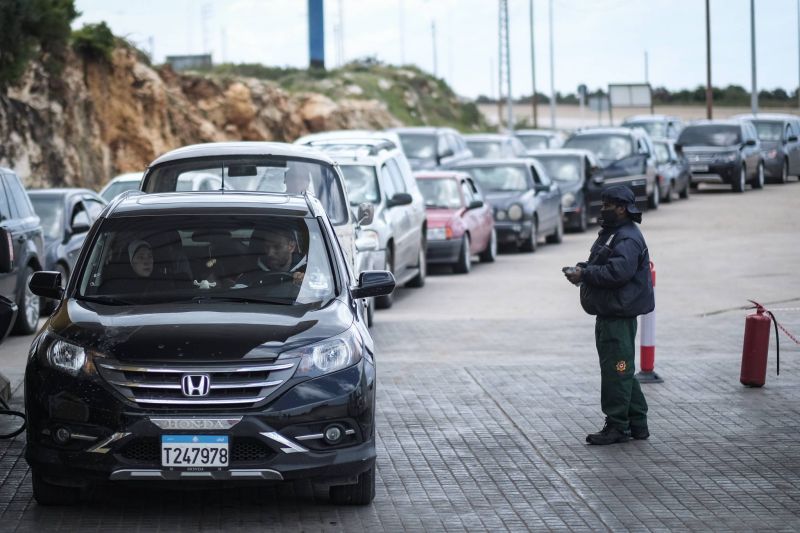
Although fuel deliveries may temporarily relieve the shortages of recent weeks, gas lines are here to stay, one importer told L’Orient Today. (Credit: João Sousa/L’Orient Today)
Want to get the Morning Brief by email? Click here to sign up.
Gas stations started receiving fuel deliveries on Thursday night, distributors and station owners told L’Orient Today. But after another day of motorists across the country struggling to find fuel to refill their tanks, one importer cautioned that the deliveries are merely a “morphine injection” and that while they may temporarily alleviate recent fuel shortages, gas lines are here to stay. The warning comes as the Energy Ministry hiked fuel prices for the second time this week, increasing the price of diesel by another 18 percent and 95- and 98-octane by another 15 percent. Since the state announced a partial end to fuel subsidies last week, fuel prices have risen by almost 55 percent on average.
Subsidies on medicines and medical equipment will remain unchanged — for now. An announcement from President Michel Aoun’s office that the program will remain in place for the moment followed a meeting between Aoun and the caretaker premier, held amid speculation that adjustments to the scheme were imminent. However, the presidency’s statement added that the Health Ministry will examine the prospects for changes in subsidies on some drugs. Even with the subsidy program in place, the health care sector continues to battle drug and medical supply shortages as importers claim that payment delays from BDL are backing up the supply chain, while BDL says importers are hoarding their stock, causing the deficiencies.
Banque du Liban has decreased the quantity of lira banknotes in circulation for the first time since August 2019. BDL’s latest interim balance sheet shows a drop of LL21 billion in circulation during the second half of June, bringing the total amount to LL40.34 trillion. By comparison, the average biweekly change this year was an increase of LL858 billion. The decrease of lira in circulation reflects BDL’s latest efforts to stabilize the national currency. The central bank has been selling dollars in exchange for cash lira, and has placed tight restrictions on the sum of cash lira that commercial banks can withdraw from their current accounts at BDL. Commercial banks in turn have slashed depositors’ withdrawal limits. Additionally, BDL’s foreign assets, which mainly represent its reserves, decreased by about $547 million in June. This drop means BDL has fewer dollars to finance essential imports.
Ten Lebanese Christian leaders, including Maronite Patriarch Bechara al-Rai, met with Pope Francis in Vatican City yesterday. The visit consisted of three closed sessions preceded by a prayer at the papal altar inside the basilica. The delegation’s trip came at the behest of the pope, who called for a day of reflection and prayer on the challenges that he has said “threaten the very existence” of pluralistic Lebanon. The pope, who completed a historic trip to Iraq earlier this year, previously expressed a desire to visit Lebanon after the government is formed. Images circulating on local media showed President Michel Aoun — who did not join his Christian ilk at the Vatican — watching the proceedings on television. Meanwhile, a monthslong stalemate between Aoun and Premier-designate Saad Hariri has for the better part of a year left the country bereft of a cabinet to make much-needed reforms.
Children are “bearing the brunt” of Lebanon’s crippling economic crisis, a UNICEF survey has found. The survey of 1,244 households, which was administered by the United Nations Children’s Fund in April and whose results were released yesterday, found that more than three-quarters of the respondent households do not have enough food or money to afford food. More than 30 percent of the households surveyed also reported that children had skipped meals in the past month, while 15 percent of families said they have halted their children's education. With 77 percent of the families saying they do not receive any type of social assistance, UNICEF called for the government to expand cash assistance, health care and education services. However, any action on this demand seems far fetched given that the country is in its 11th month without a fully empowered cabinet.
Sunday marks 11 months since the Aug. 4 Beirut port blast, one of the biggest non-nuclear explosions in recorded history. But almost a year after the port explosion, only scant compensation has been provided for its victims, and no findings from a state-sanctioned investigation into the blast, which is dogged with accusations of corruption, have been made public. To date, it is still not known what has triggered an initial fire at the warehouse that caused the explosion, or who was responsible for storing explosive ammonium nitrate at a port warehouse for years.
